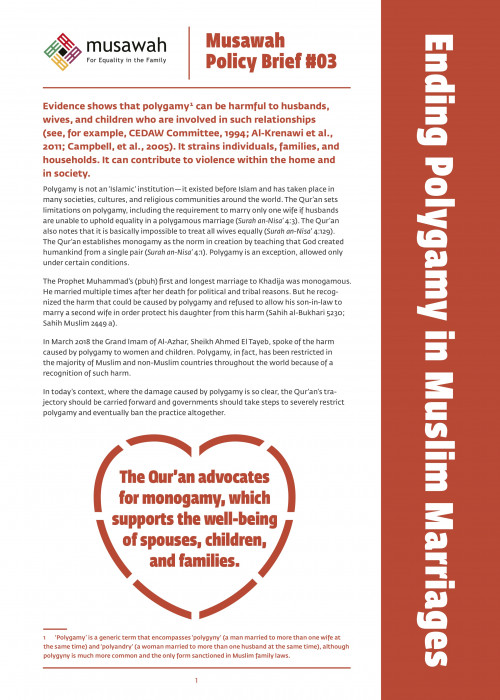‘Policy Brief 3: Ending Polygamy in Muslim Marriages’ outlines the case for ending polygamy in Muslim marriages, instead advocating for monogamy as laid out in the Qur’an. Evidence shows that polygamy can be harmful to husbands, wives, and children who are involved in such relationships, as they strain individuals, families, and households, and can contribute to violence within the home and in society. This policy brief shows why monogamy is the preferred form of marriage, why the laws can be changed, where reform has occurred, and how we can ensure equality and justice.
Polygamy is not an ‘Islamic’ institution—it existed before Islam and has taken place in many societies, cultures, and religious communities around the world. The Qur’an sets limitations on polygamy, including the requirement to marry only one wife if husbands are unable to uphold equality in a polygamous marriage (Surah an-Nisa’ 4:3). The Qur’an also notes that it is basically impossible to treat all wives equally (Surah an-Nisa’ 4:129). The Qur’an establishes monogamy as the norm in creation by teaching that God created humankind from a single pair (Surah an-Nisa’ 4:1). Polygamy is an exception, allowed only under certain conditions.
Please refer to the Policy Brief 3 resource list here.
‘Policy Brief 3: Ending Polygamy in Muslim Marriages’ is available in ENGLISH, ARABIC, SINHALA and TAMIL
—–
“ورقة سياسات 3: القضاء على تعدد الزوجات في قوانين الأسرة المسلمة”، تعرض لأهم أضرار تعدد الزوجات، وتدعو إلى الاكتفاء بزوجة واحدة. تشير الدراسات إلى أن التعدد يضر بمصلحة الأزواج، والزوجات، والأطفال في الزيجات التعددية، حيث يؤدي إلى الضغط على الأفراد، وموارد الأسرة والمنزل، والمجتمع بأسره. تشرح هذه الورقة كيف أن الزواج بواحدة فقط هو الصيغة المثلى، وأين حدثت الإصلاحات، وكيف يمكن ضمان العدالة والمساواة
لا توجد ممارسة تعدد الزوجات فى المجتمعات المسلمة فقط، حيث كانت شائعة في مجتمعات قبل الإسلام، في عدة أماكن، وثقافات، وجماعات دينية على مستوى العالم. وقد وضع القرآن بعض القيود على تعدد الزوجات، تتضمن الأمر باتخاذ زوجة واحدة حال عدم استطاعة الزوج تحقيق العدل بين الزوجات (سورة “النساء”، الآية 3). كما يؤكد القرآن بأن العدل بين الزوجات مستحيل في الأساس (سورة “النساء”، الآية 129). وقد جعل القرآن الزواج من واحدة، هو العرف السائد في الخليقة، حيث يقول إن الله قد خلق البشر كزوج وزوجة (سورة “النساء”، الآية 1). وهكذا، يعد تعدد الزوجات استثناءً لا يُسمح به إلا تحت ظروف محددة
IN THIS SERIES:
‘Policy Brief 1: Why Muslim Family Law Reform? Why Now?’ is available in ENGLISH and ARABIC.
‘Policy Brief 2: Ending Child Marriage in Muslim Family Laws’ is available in ENGLISH and in ARABIC.
‘Policy Brief 4: Equal Divorce Rights in Muslim Family Laws’ is available in ENGLISH and ARABIC.
‘Policy Brief 5: Fair and Just Financial Rights Upon Divorce’ is available in ENGLISH and ARABIC.
‘Policy Brief 6: Upholding the Best Interests of the Child in Custody and Guardianship’ is available in ENGLISH and ARABIC.
‘Policy Brief 7: Marriage as a Partnership of Equals’ is available in ENGLISH and ARABIC.

